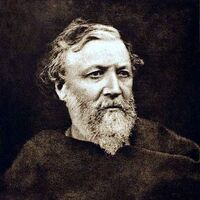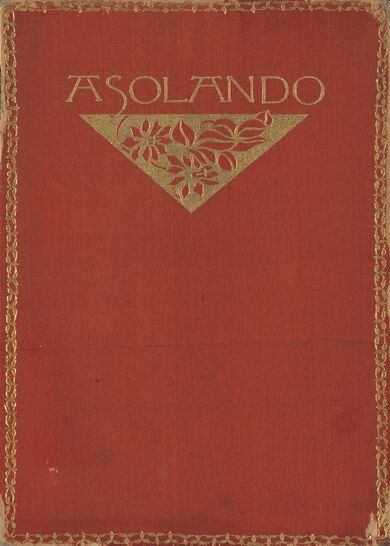How It Strikes a Contemporary
YOU saw go up and down Valladolid,
A man of mark, to know next time you saw.
His very serviceable suit of black
Was courtly once and conscientious still,
And many might have worn it, though none did:
The cloak that somewhat shone and showed the threads
Had purpose, and the ruff, significance.
He walked and tapped the pavement with his cane,
Scenting the world, looking it full in face,
An old dog, bald and blindish, at his heels.
They turned up, now, the alley by the church,
That leads no whither; now, they breathed themselves
On the main promenade just at the wrong time.
You 'd come upon his scrutinizing hat,
Making a peaked shade blacker than itself
Against the single window spared some house
Intact yet with its mouldered Moorish work;
Or else surprise the ferrel of his stick
Trying the mortar’s temper 'tween the chinks
Of some new shop a-building, French and fine.
He stood and watched the cobbler at his trade,
The man who slices lemons into drink,
The coffee-roaster’s brazier, and the boys
That volunteer to help him turn its winch.
He glanced o’er books on stalls with half an eye,
And fly-leaf ballads on the vender’s string,
And broad-edged bold-print posters by the wall.
He took such cognizance of men and things,
If any beat a horse, you felt he saw;
If any cursed a woman, he took note;
Yet stared at nobody,—they stared at him,
And found, less to their pleasure than surprise,
He seemed to know them and expect as much.
So, next time that a neighbor’s tongue was loosed,
It marked the shameful and notorious fact,
We had among us, not so much a spy,
As a recording chief-inquisitor,
The town’s true master if the town but knew!
We merely kept a Governor for form,
While this man walked about and took account
Of all thought, said, and acted, then went home,
And wrote it fully to our Lord the King,
Who has an itch to know things, he knows why,
And reads them in his bedroom of a night.


